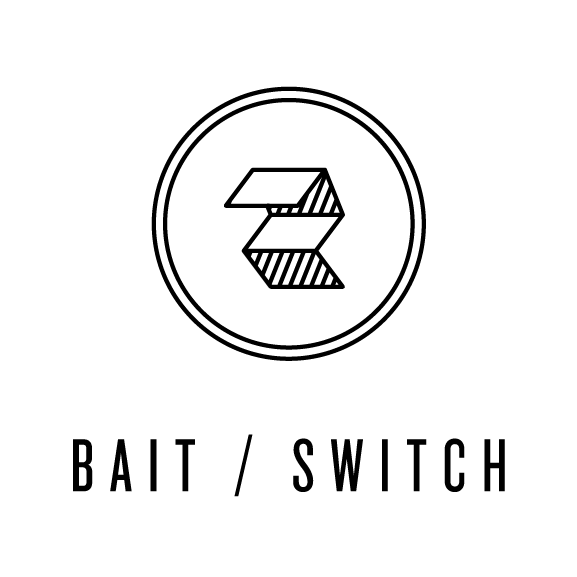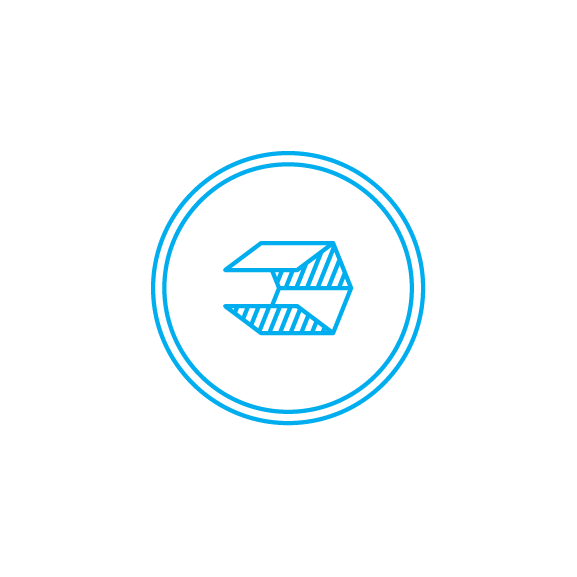I don’t Know… Something About Sacred Geometry
Jenna Rycroft
“When you sign up initially, it asks, ‘What’s your medium?’ and there’s this whole list of things, and I’m just like, ‘I don’t know, check, check, check, check.”
Interview by C. VanWinkle
Can you please describe for me what it was that you responded to?
Okay, I received something like a poem, but more in a prose form. It was three parts and they all sort of built on each other a little bit in terms of how the author was clearly responding to the piece of art that they received. It was like a circle, then a little bit bigger circle, in terms of thinking and processing the themes that they were exploring.
What was your first impression of it? What did you think?
I liked it. It was kind of heavy, in a good way. It wasn’t the sort of poem that was a microscope on this one element of beauty and exploring it and unraveling it. It was more blown out, exploring a much more philosophical thing. So that was kind of cool. I like the different sections of it. I like the wandering of it, but it’s still tied into this idea of interconnectedness that they carry through in different ways.
Well, what happened next? Where did you take it?
So I read it and I felt like I needed a visual element, because it was such a broad stroke of talking about different things. There are definitely visual elements that were in there. But because it wasn’t examining those so closely, I wanted to ground it with some sort of imagery to tie it together, and I really homed in on the idea of the golden thread. I think the author said their sister used to weave or stitch or something, and I felt like stitching or connecting things was the core of what ran through the poem itself.
I wanted to do a black-and-white illustration. But see, the last time I was drawing regularly was when I was like 10 years old. For those of you keeping score at home, that’s like three-quarters of my life ago. So it’s a little rusty skill. I kind of got a little overwhelmed by it. But I thought that it just had to be that, you know? One thing I found with his experience is when I first have a response to something and I picture what it has to be, then it just has to be that. I don’t really know how to try to do something different.
When the person was talking about the spiraling and the unity and the connectivity of everything, it had me thinking about sacred geometry and the golden ratio. There’s this gnomic spiral that is one aspect of it. I thought about that imagery and decided to put something together with that.
Okay. I think you covered a lot of ground.
[laughs] Maybe this is why I like the poem! Because it’s right out of my mind, you know? It’s like, Oh I just thought of this cool—now I’m thinking of the universe and the gravitational pull of—and it’s like what?
I appreciate that there are small things and big things and things that are easier to depict and things that are more conceptual. Now that the thing is finished, if you think back to what you intended to do when you started, is this the piece you set out to make?
Yeah! I guess so. As you can tell from my first response, it’s pretty abstract. So that became a little overwhelming when I first sat down. I had all these crazy ideas in my head, but I really didn’t know what to do with them or how to connect them, except for some basic things which I stuck with. But since there wasn’t something specific, I was kind of just going with the flow, then I can say yeah, that’s what I wanted to do.
Nice.
I always kind of liked math and numbers in school. And I was really good at geometry. I came across this sacred geometry book that really focuses on integrating those philosophies with art and all this stuff from history that supposedly uses those proportions and ideas. That made a really big impact on me. For a while, I wanted to do something with math or science, you know, in your ever long journey for identity and career. That was years ago.
Then I incorporated it into this project. I found that book and I was reading through it again, and I thought, I have no idea what’s happening. My mind is too old now! It’s not elastic enough to wrap my mind around these concepts. Part of what drew me to some of those topics was the way you see them in so many different things. That creates this interconnectedness, and you see all these beautiful patterns in things. Then, ironically, that interconnectivity was one step in my path that I just blew past, to go figure out whatever it was that I needed to figure out. I really don’t remember anymore what that stuff was about. It was interesting to go back to a forgotten place of yourself after a long time and realize, Wow, I’m totally not connected to this at all anymore.
As a musician, do you use a lot of math? Do you think of music mathematically?
That’s an interesting, unexpected question! Actually, I think that there is a strong correlation between music and math. Obviously, there’s rhythm and counting; that’s pretty straightforward. You know, so much of math is just groups of symbols that represent ideas. Music notation falls into that. I started music at a young age and math was always easy for me, so there probably is a correlation there. I don’t know if I consciously use it in the day-to-day, but I do think that they are related.
This really important part of music is about relationships and contrast, and really that’s what math explores. Equations take numbers, throw them together, and look at the relationship between them. Or use them in different ways to come up with different things and I feel like music is really the same thing. John Cage has that famous piece that’s like four and a half minutes of silence. Basically, his statement was that all the space in between the music is just as important as the notes themselves. None of those things can exist on their own. They’re all related to each other and that’s what makes it work. I feel like math explores that same thing but with numbers, what happens when they work with each other.
You said that you hadn’t really drawn anything since you were 10, so you don’t have a body of illustration to compare it to, but how does this piece fit with the rest of your creative work? Does all this stuff that you make have some things in common?
I have no idea! I guess something that’s probably apparent in my music and everything else is that exploration of relationship. How things relate to each other. How they’re similar or different. How underneath you can see the bones, the sketch, but you know that on top or below there’s so much more than meets the eye.
Do you have any advice for someone else who is approaching this project?
You know, when I did the last two pieces for this project, I was super into it. Whatever weird thing came out and it was cool. With this one, I set my mind on what I wanted to do and I was doing it, but I wasn’t totally into it in the same way. I was still committed to finishing it and I didn’t want to change it, because that’s what I wanted it to be. In retrospect, I’m really grateful for that, because often in my creative life, there are times when I start something and don’t finish it. Maybe I can’t get into it and then I end up falling off the rail and never going back to it. I think it’s important to see it through and see what happens, and I did that with this one and I feel grateful for that experience.
You know, we don’t specifically tell people to experiment or try new things. But that seems to be a direction where a lot of people take their prompts anyway and I really like that. This seems to innately be an environment that fosters experimentation. You have written something for Bait/Switch, you’ve composed a piece of music, and now you have drawn something. You seem comfortable trying new things and challenging yourself.
That’s something I really like about it, too! When you sign up initially, it asks, “What’s your medium?” and there’s this whole list of things, and I’m just like, I don’t know, check, check, check, check. I love music, but sometimes to do it, I do this dance where I have to work through a lot of self-esteem things pretty deeply. It’s like, I can do it and I can’t do it, and maybe I can’t do it at all or it’s all I can do. If I felt like I had to only do music, I would be less inclined to do it, because it feels like too much pressure. Instead, because of the way that it’s structured, I can do whatever calls to me. It allows me to block out all that noise and just be creative.
Call Number: C47PP | C48VA.ryI
Jenna Rycroft lives on the North Shore with her wife and most handsome cat. You’ll likely find her reading on the beach, finishing a puzzle, or playing guitar.




